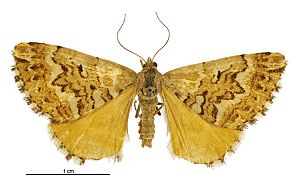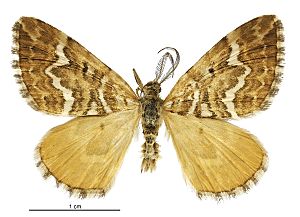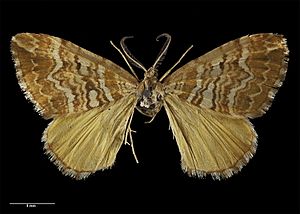Asaphodes citroena facts for kids
Quick facts for kids Asaphodes citroena |
|
|---|---|
 |
|
| Female | |
 |
|
| Male | |
| Scientific classification |
|
| Kingdom: | Animalia |
| Phylum: | Arthropoda |
| Class: | Insecta |
| Order: | Lepidoptera |
| Family: | Geometridae |
| Genus: | Asaphodes |
| Species: |
A. citroena
|
| Binomial name | |
| Asaphodes citroena (Clarke, 1934)
|
|
| Script error: The function "autoWithCaption" does not exist. | |
| Synonyms | |
|
|
Script error: No such module "Check for conflicting parameters".
Asaphodes citroena is a type of moth. It belongs to the Geometridae family, also known as "geometer moths." This moth is special because it is only found in New Zealand. This means it is endemic to that country.
Contents
About the Moth's Name
Scientists give names to all living things. This helps them organize and study different species. The Asaphodes citroena moth was first described in 1934. A scientist named Charles E. Clarke gave it the name Xanthorhoe citroena. He found the moth himself in December 1928. This was near the Franz Josef glacier in a place called Westland, New Zealand.
Later, in 1939, another scientist named George Hudson wrote about this moth. He included it in his book about New Zealand's butterflies and moths.
In 1987, a scientist named Robin C. Craw suggested a new name for the moth. He thought it should be placed in a different group, called the Asaphodes genus. Another scientist, John S. Dugdale, agreed with this idea in 1988. So, the moth's official name became Asaphodes citroena.
The very first moth specimen used to describe the species is called a holotype. This important specimen is kept safe at the Auckland War Memorial Museum.
What Does This Moth Look Like?
The Asaphodes citroena moth has wings that are mostly a deep orange color. They also have some lighter, whitish stripes. These stripes can be wavy or broken in the middle.
Male moths are usually a bit larger than females. Males have a wingspan of about 32 to 36 millimeters (about 1.2 to 1.4 inches). Females are slightly smaller, with a wingspan of about 28 to 30 millimeters (about 1.1 to 1.2 inches). The edges of their wings are also light orange, sometimes with brownish marks.
Where Does This Moth Live?
This moth is only found in New Zealand. It has been seen and collected in the Westland area.
When Can You See Them?
Adult Asaphodes citroena moths are usually active during the summer months. You can spot them flying around in December and January.
What Kind of Places Do They Like?
These moths prefer to live near the edges of native forests. They also like areas with scrub, which is a type of dense bush. Sometimes, they are found in open spaces along riverbeds.


